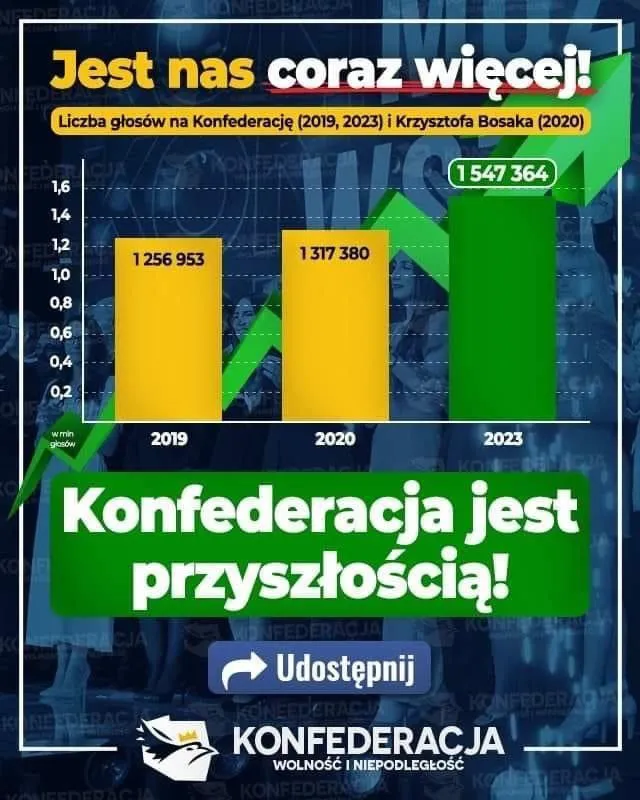With the dust settling on the Polish election results, at the time of writing, only a monumental and virtually unthinkable amount of defections by MPs from rival parties can keep the ruling ‘conservative’ Law and Justice (PiS) party in power. Despite pulling in a larger number of votes, the party no longer commands a parliamentary majority.

The opposition, the centre-left Civic Coalition (KO) will likely take the reins in a broader coalition with centrists Third Way — yes, they really named themselves that — (Trzecia Droga), and the New Left (Lewica), as they collectively possess a majority that enables them to establish a government. The only genuine right-wing candidates, Confederation (Konfederacja) finished in an underwhelming fifth position.
There has been a lot of misunderstanding about who Law and Justice (PiS) are and what they represent. Foreign media and online personalities have consistently portrayed them as bastions of patriotism or even nationalism. In reality PiS have done little to protect and secure anything beyond their own interests. Commentators, particularly those outside of Poland have confused rhetoric with policy.
In fact, so bizarre a contradiction was the government’s immigration policy — enabling and accelerating visa applications for non-Europeans, whilst loudly and staunchly opposing illegal third world immigration — that the liberal opposition used it as a major tool in their election campaign to undermine them. I will not detail the visa scandal here as Watching Poland has comprehensively covered the topic in previous articles.
In the short to medium term, a PiS government is preferable to the Donald Tusk-led Civic Coalition, whose assortment of parties are bound to run into conflict with one another. The remarkable eleven-party-alliance (part of the aforementioned three coalitions that took 2nd, 3rd and 4th place in the voting) ranges from the Polish People’s Party (PSL)’s mildly conservative leanings to the Third Way’s essentially ideological blank sheet to PO’s EU and rainbow flag-tinged agenda, all the way down to Wiosna’s blue-haired-brigade of open borders and Western abortion practices. The one thing they share is their collective disdain for Law and Justice, making a coalition a no-brainer for them.
PiS and Civic Platform (PO) have dominated the political landscape for decades, creating an unhealthy duopoly. Neither party inspires genuine passion any more, even amongst their own support, with voters of both sides simply eager to prevent the other getting into power. Like previous Polish election campaigns, both focused most of their efforts on slinging mud at one another, partially because neither had much to offer by way of convincing policies.
The most disconcerting election outcome for nationalists and traditionalists was Konfederacja only gaining 7.1% of the vote, despite polling over twice that figure earlier this year. When the results started to come in, media broadcasted images of the reactions from the five main coalitions HQs. PiS, PO, The Third Way and Lewica were are all hugs and smiles acting as each had won, and in a sense they all had. PiS won the most votes whilst the other three knew they were about to be part of the coalition forming the new government. Only the Confederation’s candidates cut gloomy figures, admitting failure.
That’s all the black pills I have to distribute. There are plenty of reasons for optimism, and I am not merely grasping at straws in an effort to lift the mood. Firstly, one of the most eye-opening voting demographic differentials on the right is age. There are three parties in Poland right of centre: PiS, who have not gained new support for a long time, PSL, who pretty much exclusively represent farmers and the Confederation. A post-election IPSOS poll showed that 42% of PiS voters were over 60. By contrast 38.8% of Konfederacja support was from 18–29 year olds and 32.5% were 30–39. PiS methods and policies were stale and desperate. For example, 500+ (recently boosted to 800+) — a scheme providing 500 zloty per month per child, which has done nothing to improve the nation’s flagging birthrates and instead just created an underclass dependent on welfare (something which virtually all parties, aside from Konfederacja, have pledged to continue). There was also a laughable pie in the sky announcement of a potential olympic bid in the run up to the election. And few things have made them look more beleaguered than obsessively harking on about Donald Tusk’s past and his flaws. The approach reflects their noticeably older politicians, exemplified by their 74-year-old wily but out-of-touch party leader Jarosław Kaczyński.
Interestingly, but perhaps unsurprisingly, the poll also showed a gender split, with 71% of Konfederacja’s voters being male. The New Left’s support was 62% female, also gaining the majority of their votes from the under-40s.
Whilst several other parties captured more of the under-30 votes than the Confederation, it should be viewed within the context of the desperation of the majority of voters to put an end to PiS’ time in government and thus their preference for a party which would be part of a coalition that could topple the ruling party.
Like in most countries, the real right has little to no political traction within traditional media, but its marginalisation has made it far more innovative than its rivals. Confederation’s dominance of Polish politics on social media was a phenomenon in 2023 and a real platform upon which to build. In February this year, they had 6.44m views on TikTok, Lewica had 1.18m, whilst Tusk’s PO managed 0.46m. On X (then Twitter) the Confederation reached 6.3m, compared to second placed PiS’ 1.3m. On YouTube they hit 3.48m; in contrast the second best numbers were Lewica’s with 0.27m. Additionally, the Confederation’s rallies around Poland in the run-up to the election drew big attendances in every Polish city, with Bosak and Mentzen reshaping Polish politics into something youthful and engaging.
The task for Konfedercja is to regroup, cut the dead weight (which they already appear to be taking steps towards), further professionalise their operation and fill the void left by the likely crumbling of PiS into various factions before they can potentially reorganise. There is undoubtedly a yearning amongst the Polish public for a strong, young party capable of standing up to external pressures and dealing with a concerning immigration situation, which is starting to resemble the beginnings of Western mass immigration. PO’s use of the visa scandal in their election campaign illustrated that centrists and moderate leftists are eager to keep Poland as homogeneous as possible. Unlike in the West, it is still not particularly controversial for these groups to express their unease with the browning of their cities.

The number of votes the Confederation accumulated at the last three elections (two parliamentary and one presidential)
Furthermore, there is a significant degree of respect for co-chairman Krzysztof Bosak from moderates, who see a young, sharp, competent and eloquent orator. The party would have undoubtedly found more success in the election were they not hammered from all sides by the mainstream media, which typically highlighted a few of their controversial members to tarnish the party as conspiracy theorists or women haters. Whilst the unfavourable framing is not going to change any time soon, the mainstream media are on the wane and the Confederation have the online foundation and potential for support to combat them. Next time round, it will be off the back of a pro-EU, left-leaning government’s term in office, which will have made the Confederation’s talking points all the more pertinent.









